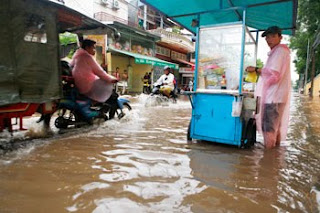
RFA
Monks march through downtown Rangoon, Sept. 24, 2007.
BANGKOK —Burma's Buddhist monks, who led the "Saffron Revolution" of September 2007, are better organized since the military crackdown that killed unknown numbers, with more prominent religious figures joining their movement, according to a key overseas activist.
U Awbasa, leader of the Thailand-based Exiled Burmese Buddhist Monks Association, fled Burma amid thousands of arrests in the crackdown on the 2007 monk-led protests.
He said Burma's revered Buddhist monks are still highly politically active despite the military crackdown.
"The monks’ movement within the country has become tighter, and the strength of the monks has also become greater," U Awbasa said.
"A lot of people who were not interested in the issue have now started taking interest."
He said the All Burma Monks’ Organization is still active inside the country.
"We know that its leadership comprises highly respected and experienced veteran monks," U Awbasa said.
Unexpected gunfir
Monks and nuns take a vow to boycott religious services for Burma's military regime in Rangoon, Sept. 23, 2007. Photo credit: AFP
"In the past some of the highly respected abbots were not involved, but now about 20 of those abbots have joined the movement."
He said the monks still have the potential to force political change in Burma."We can say that the movement is stronger. If another movement develops, the [military government] will not be able to stop it in any way," he said.
U Awbasa, who served for 14 years in the Burmese military from 1972-86, said the monks hadn't expected the soldiers to fire on unarmed, praying monks when they launched their campaign for change two years ago this week."At the time the Saffron protests took place, we monks were very concerned that the public would be adversely affected," he said.
"The other point was that we had not expected that they would shoot at us. We, the monks were doing nothing to adversely affect them. We were monks marching and recited prayers. We even requested the public not to participate, as they could face difficulties."
He said that public and civil organizations joined the movement late, on Sept. 27, after security forces attacked protesting monks near the Shwedagon Pagoda in the former capital, Rangoon.
Public drawn in

A monk speaks through a megaphone to a group of people in Rangoon, September 25, 2007. Photo credit: AFP
"The movement failed because the authorities systematically planned and plotted to crush it, not because of poor participation."
He said government forces and hired thugs staged military-style raids on monasteries on the night of Sept. 27, deliberately aiming their guns at the monks and shooting to kill.
"The cruelties they committed were so extreme that the monks decided that if they continued their movement the public would suffer, so we reduced our activities," U Awbasa said.
"If the public had participated in force, a lot more people would have been killed."
Original reporting in Burmese by Khin May Zaw. Burmese service director: Nancy Shwe. Translated by Soe Thinn. Written for the Web in English by Luisetta Mudie. Edited by Sarah Jackson-Han.
Source: Radio Free Asia Click Here






